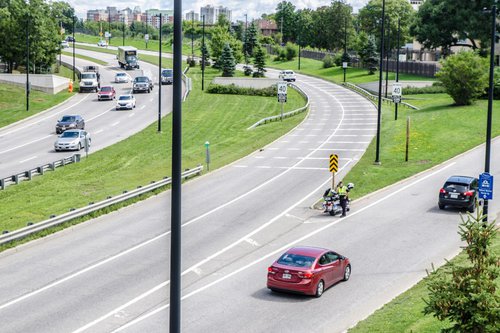What is Ontario’s Back on Track Program for Those Convicted of DUI?

As a frequent reader of our Knowledge Centre criminal law blog, you’re probably familiar with the penalties and other aggravations that come with a first-time driving under the influence (DUI) of alcohol and/or drugs conviction in Ontario. If not, here’s a recap, which we suggest you memorize so that you can recite it anytime you or someone you know thinks about driving after consuming alcohol or drugs:
- One-year driver’s license suspension.
- Medical evaluation to determine driving fitness.
- $1,000 fine.
- Mandatory enrollment in Ontario’s “Back on Track” education/treatment program before license reinstatement.
- Mandatory installation and use of ignition interlock device upon license reinstatement.
- Minimum $1,894 in fees to participate in the Back on Track and Ignition Interlock programs.
- Minimum $281 in fees for driver’s license reinstatement.
- A criminal record, and the stigma and potential impacts on employment, education, and travel that come with it.
- “High-Risk” annual insurance premium increases that range from $2,000 to $10,000, depending on vehicle make, model, year, and other factors.
- Alternative transportation costs during license suspension.
- Potential impacts to employment, education, travel, and other facets of your life caused by losing your driver’s license.
Most of these penalties and aggravations are self-explanatory, though you may need to be more familiar with the Ignition Interlock and Back on Track programs. We reviewed the Ignition Interlock program a couple of years ago, which you can review here . In this article, we will review the Back on Track program. If you’re smart, though, you’ll avoid getting behind the wheel if impaired so that you will never have to get yourself personally back on track.
Back on Track is Mandated by Provincial Law
The Government of Ontario initiated the Back on Track program with 1998 legislation in the Highway Safety Act. The stated goal of the program is to “help people learn to separate drinking and other drug use from driving.” Under this provincial law, anyone convicted of a Criminal Code DUI offence must successfully take the remedial measures program before the Ministry of Transportation will reinstate their driver’s license. Let us emphasize that failure to complete all program components results in the continuing suspension of the driver’s license.
Back on Track is also mandated for drivers who receive two or more alcohol or drug-related administrative license suspensions. Judges can also order program participation for those convicted of certain careless or dangerous driving offences. The current fees for Back on Track are $894 for those convicted of criminal DUI or $344 for administrative suspensions. However, those with three or more administrative suspensions must pay the full $894 fee.
Back on Track Program Components
Back on Track participants complete the program in three stages. The first step is a one-hour assessment to determine whether the participant must take the eight-hour educational workshop or the 16-hour treatment workshop. Those enrolled due to an administrative suspension are automatically required only to take the eight-hour workshop unless they have three or more suspensions.
The eight-hour educational workshop includes presentations, exercises, discussions, and group sessions. Primary topics include:
- Alcohol and drug facts.
- How alcohol and drugs impact driving performance
- Consequences of an impaired driving conviction.
- How to avoid drinking and driving.
The 16-hour treatment workshop includes the same classroom activities and a personal planning session. The treatment workshop is designed to help participants:
- Learn why people drink or use drugs and how it affects their lives.
- Take responsibility for their alcohol and drug use and consequences.
- Commit themselves to reducing or stopping problematic alcohol or drug use.
- Learn strategies for managing things that might make them want to drink or use drugs.
- Avoid relapses and make overall healthier life choices.
- Avoid alcohol, drugs, and impaired driving.
Six months after the successful completion of the workshop, participants must attend a 30-minute follow-up interview. This is designed to assess the participant’s success in meeting workshop-proscribed goals and reinforce strategies for avoiding drinking, drugs, and impaired driving.
Back on Track Participant Requirements
To pass the three stages of Back on Track, participants must successfully follow program requirements. These include:
- Actively participate in and complete all program parts.
- Treat staff and other participants with respect.
- Demonstrate that you have learned how to separate drinking/drug use from driving.
- Abstain from alcohol and drug use for 24 hours on the days you participate in the program.
- Not emitting odours or other signs that you may have consumed alcohol or drugs on program participation days.
- Avoid using prescription drugs if they impair program participation.
- Arrive at program sessions and workshops on time.
Failure to meet these requirements will force you to re-register and pay for another attempt at completing the Back on Track program. That said, participants can miss a workshop or session and take a make-up one if they provide 24 hours’ notice. Serious illness, a death in the immediate family, and severe weather are the only acceptable reasons for missing a session absent 24 hours’ notice.
Other Program Considerations
Back on Track can take time to complete, so to avoid delays in driver’s license re-instatement, those needing to participate should begin the process as soon as possible. Registration is open seven days after an impaired driving conviction or administrative suspension. Once registered, it can take up to 90 days to complete the program for administrative suspensions and 11 months for a criminal DUI conviction.
Don’t Force Yourself to Get Back on Track Due to a DUI Conviction
Now that you are familiar with the Back on Track program, you probably wouldn’t want to undergo the aggravation of having to participate in it. The simple solution to avoid it is not to drive while impaired. If that solution is in the rear-view mirror because you’ve been charged with a DUI-related offence. However, if you failed to heed that advice and are now facing a criminal trial for DUI charges, it’s time to speak to an experienced criminal defence DUI lawyer. To avoid the penalties and aggravations of a DUI conviction, contact TorontoDUI for a free consultation. We have over 15 years of experience securing favourable outcomes for thousands of Greater Toronto Area clients arrested for DUI.
